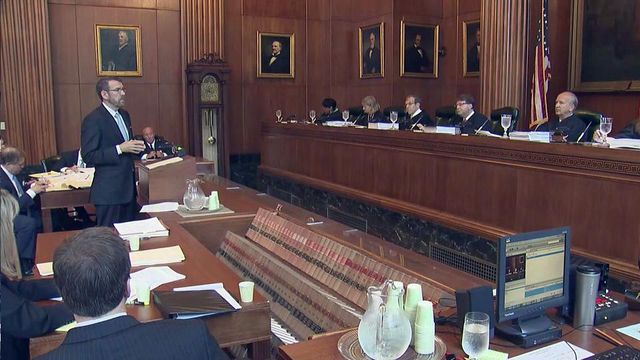High court mulls spat between McCrory, lawmakers
A battle between two branches of North Carolina government over who appoints members to various state commissions is now in the hands of the third branch for a final determination.
Gov. Pat McCrory and former Govs. Jim Hunt and Jim Martin sued the General Assembly last fall, arguing that lawmakers were overstepping their authority by creating independent commissions to govern the cleanup of coal ash, oversee drilling for oil and natural gas and manage mining operations in the state. All three carry out administrative functions, he maintains, so the executive branch should control who sits on the commissions and how they are run.
A special panel of three Superior Court judges agreed with McCrory and his predecessors in March, ruling that the legislature violated the separation of powers doctrine that divides different responsibilities between the branches of government.
House Speaker Tim Moore and Senate President Pro Tem Phil Berger appealed the ruling, setting up Tuesday's arguments before the North Carolina Supreme Court.
John Culver, an attorney representing legislative leaders, told the justices that the General Assembly's power to appoint people to state commissions has been recognized under the state constitution since 1875.
"The system as presently constituted has worked well for our state," Culver said. "The court should not adopt the governor's radical restructuring of how our state government is run."
North Carolina's governor has never held the type of power the president has over federal appointments, he said, but that is what McCrory wants.
Culver said the state constitution and state law instead vests all appointment power with the legislature, and lawmakers could choose to not give McCrory the authority to name a single member of any of the commission.
"As the branch of government that is most responsive to the people – elected every two years from every county in the state – it's the General Assembly that should be making those sorts of public policy determinations," he said.
Assistant Attorney General Ann Matthews, who represented the members of the commissions, added that simply naming people to the boards doesn't give lawmakers control over them, noting that appointees take an oath to uphold the constitution just like every elected official.
"These commissioners are agents of the people of North Carolina, not the governor and not the General Assembly," Matthews said.
McCrory attorney John Wester said, however, that the dispute goes beyond simple appointment power to the separation of powers that has defined American government for more than two centuries.
"Once the legislature has done its critical work, to be sure, of passing the laws, its work is complete," Wester said. "The separation of powers has drawn firm lanes for the traffic of government to move in. Once they have passed the laws, their work is complete, and they cannot – must not – make that appointment."
Similar to Culver's argument that lawmakers could make all appointments if they choose to do so, Wester said all appointments should belong to the governor to carry out his executive branch duties.
"The General Assembly violates separation of powers when it retains some control over the execution of the laws," he said.
A decision in the case isn't expected for two to three months.










